Dunkirk
|
Dunkirk |
|
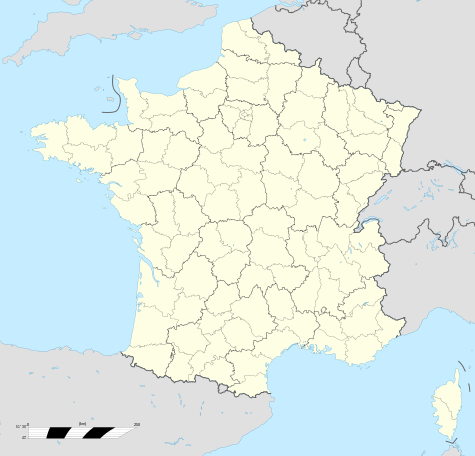 Dunkirk
|
|
|
Location within Nord-Pas-de-Calais region
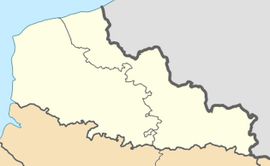 Dunkirk
|
|
| Administration | |
|---|---|
| Country | France |
| Region | Nord-Pas-de-Calais |
| Department | Nord |
| Arrondissement | Dunkirque |
| Intercommunality | Dunkerque grand littoral |
| Mayor | Michel Delebarre (2008–2014) |
| Statistics | |
| Elevation | 0–17 m (0–56 ft) (avg. 4 m/13 ft) |
| Land area1 | 37.34 km2 (14.42 sq mi) |
| Population2 | 70,850 (1999) |
| - Density | 1,897 /km2 (4,910 /sq mi) |
| INSEE/Postal code | 59183/ 59140, 59240, 59640 |
| 1 French Land Register data, which excludes lakes, ponds, glaciers > 1 km² (0.386 sq mi or 247 acres) and river estuaries. | |
| 2 Population sans doubles comptes: residents of multiple communes (e.g., students and military personnel) only counted once. | |
Dunkirk (French: Dunkerque, pronounced: [dœ̃kɛʁk]; Dutch: Duinkerke(n) [ˈdœynkɛrkə(n)] (![]() listen); French Flemish: [ˈdyŋkarkə](
listen); French Flemish: [ˈdyŋkarkə](![]() listen)) is a commune in the Nord department in northern France. It lies 10 kilometres (6 miles) from the Belgian border. The population of the city (commune) at the 1999 census was 70,850 inhabitants (71,300 inhabitants as per February 2004 estimates). The population of the metropolitan area was 265,974 inhabitants as per the 1999 census.
listen)) is a commune in the Nord department in northern France. It lies 10 kilometres (6 miles) from the Belgian border. The population of the city (commune) at the 1999 census was 70,850 inhabitants (71,300 inhabitants as per February 2004 estimates). The population of the metropolitan area was 265,974 inhabitants as per the 1999 census.
Contents |
Name and languages
Its name is derived from West Flemish "dun(e)" (dune) and "kerke" (church), related to the colloquial Scots English "kirk". Until the middle of the 20th century the city was situated in the French Flemish area; today the local Flemish dialect, a variety of the Dutch language, can still be found but has been largely replaced by French.
History
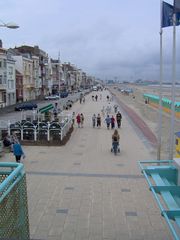
Middle Ages
Dunkirk was first mentioned in 1067 as Dunkerk (Dutch: “Church of the Dune” or "Dune Church").
Privateer base
The area was much disputed between Spain, England, the Netherlands and France.
At the beginning of the Eighty Years' War, Dunkirk was briefly in the hands of the Dutch rebels, from 1577 until 1583. But in the last year the Prince of Parma re-established Spanish rule there and made it a base of naval operations against the Dutch, first by a small royal squadron of warships and later by a growing number of privateers to whom the Habsburg authorities in the Low Countries began issuing letters of Marque - launching the centuries-long career of the infamous Dunkirkers (known in the Dutch language as the 'Duinkerker kapers' (kaper = privateer)): private shipowners operated whole privateer fleets to intercept merchants from countries hostile to the Spanish Habsburgs.
The 1600 Battle of Nieuwpoort, one of major military engagements of the Eighty Years' War, was part of a major Dutch military effort to reach and conquer Dunkirk by land. However, though Maurice of Nassau on that occasion defeated the Spanish, he was unable to reach Dunkirk due to overextended supply lines, and the pirate activity from that city continued unabated.
The Dunkirkers briefly lost their home port, as the city was conquered by the French in 1646, but recaptured by the Habsburgs in 1652.
In 1657, as a result of war between Oliver Cromwell's Commonwealth and the Kingdom of Spain, it was captured by English forces, and was awarded to England in the peace the following year (see Battle of the Dunes (1658).
It became definitively French when Charles II of England sold it to France for £320,000[1] on 17 October 1662.
During the reign of Louis XIV, a large number of commerce raiders had again their base at Dunkirk; Jean Bart was the most famous, known for attacking Dutch ships. The Man in the Iron Mask was also arrested in Dunkirk.
The 18th century Swedish privateer and pirate Lars Gathenhielm, and his wife and partner Ingela Hammar, are known to have sold in Dunkirk much of the loot from ships plundered further east.
See 1763's "Treaty of Paris" for details of 18th century treaties between France and England restricting French rights to fortify Dunkirk (resulting from a British fear of it being used as an invasion base).
Dunkirk in World War II
In May 1940, during the Battle of France, the British Expeditionary Force in France aiding the French, was cut off from the rest of the French Army by the German advance. Encircled by the Germans they retreated to the area around the port of Dunkirk. The German land forces could have easily destroyed the British Expeditionary Force, especially when many of the British troops, in their haste to withdraw, had left behind their heavy equipment. For years, it was assumed that Adolf Hitler ordered the German Army to stop the attack, favouring bombardment by the Luftwaffe. However, according to the Official War Diary of Army Group A, Field Marshall Gerd von Rundstedt, the Chief of the General Staff, ordered the halt. Hitler merely validated the order several hours after the fact. This lull in the action gave the British a few days to evacuate by sea. Winston Churchill ordered any ship or boat available, large or small, to pick up the stranded soldiers, and 338,226 men (including 123,000 French soldiers) were evacuated - the miracle of Dunkirk, as Churchill called it. It took over 900 vessels to evacuate the Allied forces. More than 40,000 vehicles as well as massive amounts of other military equipment and supplies were left behind; their value being less than that of trained fighting men. The British evacuation of Dunkirk through the English Channel was codenamed Operation Dynamo. 40,000 Allied soldiers (some who carried on fighting after the official evacuation) were captured or forced to make their own way home through a variety of routes including via neutral Spain.
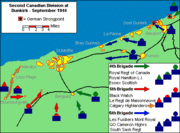
The city was again contested in 1944, and the 2nd Canadian Infantry Division attempted to liberate the city in September, as Allied forces surged northeast after their victory in the Battle of Normandy. However, German forces refused to relinquish their control of the city, which had been converted into a fortress, and the garrison there was "masked" by Allied troops, notably 1st Czechoslovak Armoured Brigade. The fortress under command of German Admiral Friedrich Frisius eventually unconditionally surrendered to the commander of the Czechoslovak forces, Brigade General Alois Liška, on 9 May 1945.[2]
During the German occupation, Dunkirk was largely destroyed by Allied bombings; the artillery siege of Dunkirk was directed on the final day of the war by pilots from No. 652 Squadron RAF, and No. 665 Squadron RCAF.
Postwar Dunkirk
On 14 December 2002, the Norwegian auto carrier Tricolor collided with the Bahamian-registered Kariba and sank off Dunkirk Harbour, causing a hazard to navigation in the English Channel.
Heraldry
.svg.png) |
The arms of Dunkirk are blazoned : |
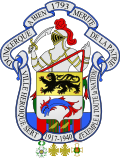
Full achievement of the arms of Dunkirk
|
Administration
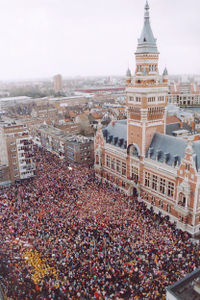
The commune has grown substantially by absorbing several neighbouring communes:
- 1970: Merger with Malo-les-Bains (which had been created by being detached from Dunkirk in 1881)
- 1972: Fusion with Petite-Synthe and Rosendaël (the latter had been created by being detached from Téteghem in 1856)
- 1980: Fusion-association with Mardyck (which became an associated commune, with a population of 372 in 1999)
- 1980: A large part of Petite-Synthe is detached from Dunkirk and included into Grande-Synthe
- 2003: Project of fusion with Saint-Pol-sur-Mer (commune created by its territory being detached from Petite-Synthe in 1877). On 19 December 2003, the municipal councils of Dunkirk and Saint-Pol-sur-Mer decided in favour of a fusion-association, which would create a new entity with a population of 94,187. The prefect requested a referendum, although this procedure was not mandatory (it became mandatory on 1 January 2005). The referendum took place on 5 December 2004, actually covering 3 communes: Dunkerque, Saint-Pol-sur-Mer and Fort-Mardyck. Although the yes won with 54 % of the votes, it did not gather 25% of the potential electorate, as required by the law. The prefect rejected the fusion proposal as a consequence.
Economy
Dunkirk has the third largest harbour in France, after those of Le Havre and Marseilles. It is also an industrial city, heavily dependent on the steel, food processing, oil refining, ship building and chemical industries.
Tourist attractions
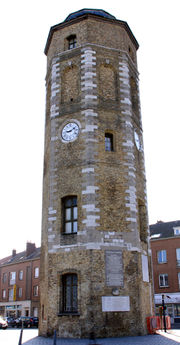
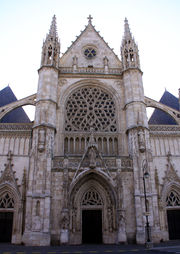
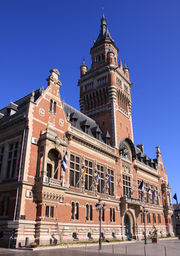
- The Musée Portuaire displays exhibits of images about the history and presence of the port.
- The Musée des Beaux-Arts has a large collection of Flemish, Italian and French paintings and sculptures.
- The Carnival of Dunkirk
Transport
Dunkirk has a ferry connection with Dover, England. The Gare de Dunkerque train station offers connections to Calais, Lille, Arras and Paris, and several regional destinations.
Sports
- USL Dunkerque, French football club, currently playing in the CFA.
- The Quatre Jours de Dunkerque (or Four Days of Dunkirk) is an important elite professional road bicycle racing event.
- Stage 2 of the 2007 Tour de France departed from Dunkirk.
International relations
Twin towns — Sister cities
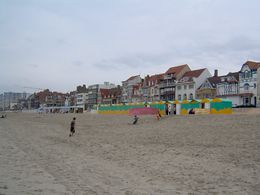
Dunkirk maintains Sister City relationships with the following cities:
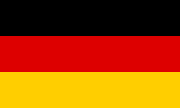 Krefeld, Germany since 15 June 1974
Krefeld, Germany since 15 June 1974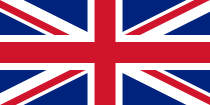 Middlesbrough, United Kingdom since April 12, 1976
Middlesbrough, United Kingdom since April 12, 1976 Gaza, Palestinian Authority
Gaza, Palestinian Authority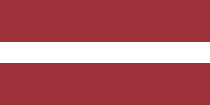 Riga, Latvia since 1960
Riga, Latvia since 1960 Rostock, Germany since 1960
Rostock, Germany since 1960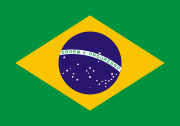 Vitória, Brazil since unknown date
Vitória, Brazil since unknown date Corumbá, Brazil since unknown date
Corumbá, Brazil since unknown date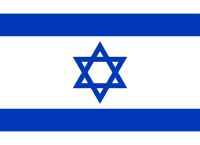 Ramat HaSharon, Israel since unknown date
Ramat HaSharon, Israel since unknown date
Dunkirk has co-operation agreements with:
 Dartford district, United Kingdom since March 1988
Dartford district, United Kingdom since March 1988 Thanet district, United Kingdom since June 18, 1993
Thanet district, United Kingdom since June 18, 1993
See also
- Dunkirk Treaty
- Dunkirkers
- French Flemish
External links
- City council website (French)
- Tourist office website
- Dunkerque in Old Postcards
- Visit Dunkirk and French Flanders
References
Notes
- ↑ "Correspondence and papers of the first Duke of Ormonde, chiefly on Irish and English public affairs: ref. MS. Carte 218, fol(s). 5 - date: 26 December 1662" (Description of contents of carte papers). Oxford University, Bodleian Library, Special Collections and Western Manuscripts: Carte Papers. 2006. http://www.a2a.org.uk/search/records.asp?cat=161-msscarte_15&cid=2-3. Retrieved 2007-10-17.
- ↑ (Czech) Czech army page
|
|||||